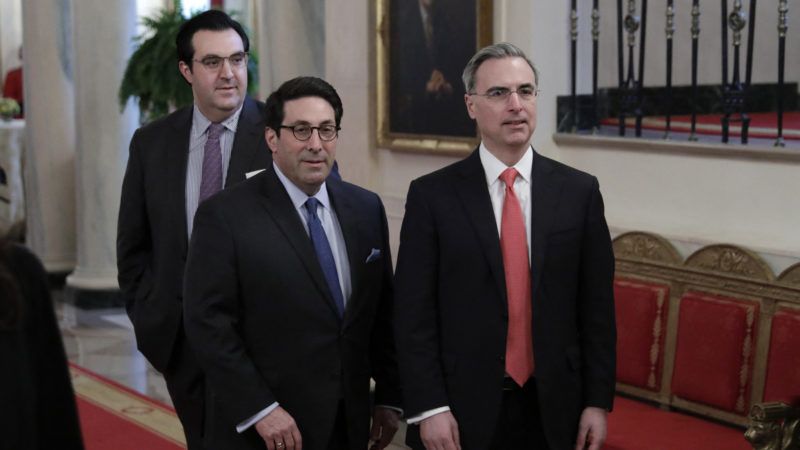Team Trump's Final Defense: He Didn't Do It, but Even If He Did, It's Not Impeachable
"You must do what the Constitution compels you to do: reject these articles of impeachment, for the Constitution and for the American people," said White House counsel Pat Cipollone.

President Donald Trump's legal team on Tuesday completed their arguments in his Senate impeachment trial, with White House counsel Pat Cipollone casting the process as overtly partisan and unconstitutional.
"You must do what the Constitution compels you to do: reject these articles of impeachment, for the Constitution and for the American people," he said. Cipollone made an appeal to the "sanctity of the voting process," telling lawmakers that a conviction would betray the results of the 2016 election and similarly meddle in the 2020 race.
Trump's defense evolved slightly over the course of three days of arguments, with the team initially emphasizing the president's purported innocence. Following John Bolton's allegations—the former national security adviser says Trump directly conditioned military aid to Ukraine on the announcement of politically motivated investigations—they then pivoted to argue that such an offense would not be impeachable. The House impeached Trump in December for abuse of power and obstruction of Congress for his role in seeking to pressure Ukrainian President Volodymyr Zelenskiy into announcing probes that targeted Trump's political foes.
"We know there was no quid pro quo on the call, we know that from the transcript," Michael Purpura, an attorney for Trump, said on Saturday. "You cannot impeach a president on an unsourced allegation," echoed lead outside counsel Jay Sekulow on Tuesday, though he added that "even if everything in there was true, it constitutionally doesn't rise to that level."
It's an argument that Alan Dershowitz, the retired Harvard law professor, zeroed in on during his presentation to the Senate on Monday evening, after previous presenters skirted addressing the Bolton claims.
"Nothing in the Bolton revelations, even if true, would rise to the level of an abuse of power or an impeachable offense," said Dershowitz. He further argued that "non-criminal conduct, including 'abuse of power' and 'obstruction of justice,' are outside the range of impeachable offenses," a reversal of the position that Dershowitz himself held during former President Bill Clinton's impeachment. In 1998, Dershowitz said that there "certainly doesn't have to be a crime" to carry out the process. Current legal consensus comports with Dershowitz's original stance, and he has acknowledged that he is now in the minority.
Ken Starr, the former independent counsel whose investigation resulted in the Clinton impeachment, spent his time on Monday afternoon arguing that an impeachment must be "powerfully bipartisan" in order to hold any legitimacy. It was an ironic moment for Starr: While he highlighted the indisputable fact that Trump's impeachment has proceeded along partisan lines, Starr was a driving force behind the last impeachment—another partisan affair—which occurred just two decades ago. As I wrote yesterday:
On the first three [Clinton impeachment] articles, just five Democratic House reps defected from party lines and voted alongside Republicans. On the last article, only one did. A heavier bipartisan consensus actually cut against impeachment, with five Republicans voting against article one, 28 against article two, 12 against article three, and 81 against article four.
Whether or not Starr has genuinely made an about-face on the particulars of impeachment and now regrets his role in the Clinton trial remains unclear. In his 2018 book Contempt, he offered a defense for the role he played, writing, "Abuse of Power stood at the center of The President's behavior." But on Monday he seemingly swung back-and-forth between rationalizing and negating the necessity of that impeachment.
"The nation's most recent experience, the Clinton impeachment, even though severely and roundly criticized, charged crimes," Starr told the Senate. And those crimes were committed "beyond any reasonable observer's doubt." Yet minutes later, he added that "the commission of a crime is by no means sufficient to warrant the removal of our duly elected president." Bipartisanship, he said, is the only metric with which to measure the necessity of an impeachment, pointing to the 410–4 vote that authorized the impeachment inquiry into former President Richard Nixon.
But Starr is wrong about the relationship between bipartisanship and impeachment. "Presidential impeachments have always been partisan," tweeted the Cato Institute's Gene Healy. "Even in the Nixon near-impeachment, a majority of Republicans on the House Judiciary Committee voted against every article."
Should we be surprised? Of course not. Politicians routinely move the moral goalposts to suit their partisan interests. Why would impeachment be any different?


Show Comments (328)